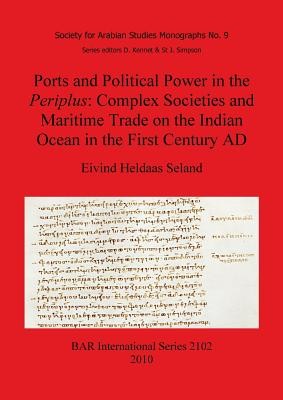
- We will send in 10–14 business days.
- Author: Eivind Heldaas Seland
- Publisher: British Archaeological Reports Oxford Ltd
- ISBN-10: 1407305786
- ISBN-13: 9781407305783
- Format: 20.8 x 29.5 x 0.8 cm, minkšti viršeliai
- Language: English
- SAVE -10% with code: EXTRA
Reviews
Description
Society for Arabian Studies Monographs No. 9
In the centuries around the turn of our era, long distance trade based on the monsoon winds connected all coasts of the western Indian Ocean. Ships from India, Arabia, Egypt, East Africa and Mesopotamia conveyed luxuries such as silk, spices and slaves, but also subsistence goods including grain and inexpensive textiles between coasts separated by thousands of kilometres of water. In the same period the first complex societies emerged in parts of Africa and Southern India. In other regions existing states reorganised or were replaced or marginalised by new polities. This study aims at exploring the significance of maritime commerce to societies on the Indian Ocean rim, by examining how rulers adjusted their policy in order to control and profit from trade. The point of departure is the anonymous Greek first century AD Periplus of the Erythraean Sea. This is a guide to navigation and trade on the Indian Ocean, covering the coasts of the Red Sea, Gulf of Aden, East Africa and India. The unknown author, who to a large extent relied on personal experience, included not only sailing directions, but also a wealth of information on local products, markets and political conditions. Chapter 1 introduces the subject and the setting. Chapter 2 discusses how to measure the impact of trade on complex societies. Chapter 3 deals with the content and reliability of the Periplus. Other chapters survey the situation along the coasts of Arabia, Africa and western / southern India in detail, and argue that rulers and states utilised a range of policies in order to profit from the monsoon trade.
EXTRA 10 % discount with code: EXTRA
The promotion ends in 23d.17:49:26
The discount code is valid when purchasing from 10 €. Discounts do not stack.
- Author: Eivind Heldaas Seland
- Publisher: British Archaeological Reports Oxford Ltd
- ISBN-10: 1407305786
- ISBN-13: 9781407305783
- Format: 20.8 x 29.5 x 0.8 cm, minkšti viršeliai
- Language: English English
Society for Arabian Studies Monographs No. 9
In the centuries around the turn of our era, long distance trade based on the monsoon winds connected all coasts of the western Indian Ocean. Ships from India, Arabia, Egypt, East Africa and Mesopotamia conveyed luxuries such as silk, spices and slaves, but also subsistence goods including grain and inexpensive textiles between coasts separated by thousands of kilometres of water. In the same period the first complex societies emerged in parts of Africa and Southern India. In other regions existing states reorganised or were replaced or marginalised by new polities. This study aims at exploring the significance of maritime commerce to societies on the Indian Ocean rim, by examining how rulers adjusted their policy in order to control and profit from trade. The point of departure is the anonymous Greek first century AD Periplus of the Erythraean Sea. This is a guide to navigation and trade on the Indian Ocean, covering the coasts of the Red Sea, Gulf of Aden, East Africa and India. The unknown author, who to a large extent relied on personal experience, included not only sailing directions, but also a wealth of information on local products, markets and political conditions. Chapter 1 introduces the subject and the setting. Chapter 2 discusses how to measure the impact of trade on complex societies. Chapter 3 deals with the content and reliability of the Periplus. Other chapters survey the situation along the coasts of Arabia, Africa and western / southern India in detail, and argue that rulers and states utilised a range of policies in order to profit from the monsoon trade.


Reviews